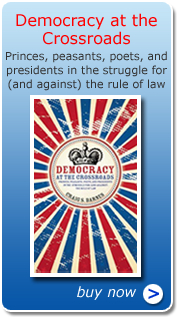It generally happens in world history that change comes to rural areas later than it comes to cities and that, no matter where you are on the planet, rural areas are more conservative politically, which is saying the same thing, really, since conservative means to want to hold on to what was good in the past, or not to change too much. Whether you are talking about rural Pakistan, or rural Russia, or rural Wyoming, the people who live—and are separated from each other by fields and forests —are likely to hold tight to traditional values and be suspicious of change.
That could be good, of course, but the bad side is that rural areas are also more likely to resist the mingling of races that comes with commerce and cities, or the rise of women’s rights, or mixture of social classes, or experimentation with education and health care, or, in fact any other form of government intervention to assist those who are in trouble.
My brother is a rancher in Arizona and he is rural and he is conservative. He talks to other ranchers from time to time, though not every day for sure because ranchers don’t live side by side, but when they do get together at cattle gathering time they are pretty comfortable with the idea that city families ought to take care of themselves much the way ranchers’ families take care of themselves. Arizona ranchers work hard, run risks chasing cattle through the rocks and cactus, leaping over rattlesnakes, and other people should expect to work hard and run risks of their own, too. Everyone has a rattlesnake or two in his life and it should not take government to take care of that problem. So my brother pretty much thinks that the farther government is from the ranch, or anybody else’s life for that matter, the better.
Which is not much different from the thinking of wheat farmers in Kansas or cotton farmers in Mississippi. Which is understandable enough and makes sense if you live on a ranch or a cotton plantation. So rural politics is full of simple exhortations about individualism and the free market or statements like “socialism is un-American” and “poor people are lazy.”
The trouble is that crowded cities require solutions that are maddeningly complex and detailed and require substantial public capital, large doses of government investment in schools, roads, water and utilities. All that takes taxes. In addition, when people are living side by side they often feel a compassionate need to take care of one another, even with taxes.
John Boehner the Republican leader from Ohio doesn’t like taxes and he doesn’t like anything complex, detailed or that requires public investment. He likes to slap down 1,000 pages of proposed legislation and cry to the heavens about how long the bill is and how nobody ever has had a chance to read it and how socialist it is and how the free market could do everything better. He could have said the same thing in 1870 or 1920. The trouble is that the world of today is not as simple as it is in Boehner’s mind, or my brother’s, or as the world was in 1870 or 1920.
The original idea behind democracy of course was for the new and old values to have a forum where they could work these issues out, get the conversation going between rural America and city America, rich and poor, top and bottom.
But last year senate Republicans used the filibuster (Senate Rule XXII) to prevent votes for nearly nine months on health care legislation. This April, they used it to stall debate on the financial reform bill and they have promised to use it against cap and trade or any other major Obama initiative. When they stop debate, they stop democracy. They promise, further, to make this tactic last all the way through to next fall’s elections so that they can say, “See, Democrats can’t do anything.”
Twenty six Republican senators in the US Senate come from rural states with populations under five million or that is they have fewer people than can be found in only two or three boroughs of Manhattan. When those 26 find only 15 more senators from the rest of the country they can stop democracy dead in its tracks.
It is time to abolish the filibuster and give the majority back their right to move forward.
